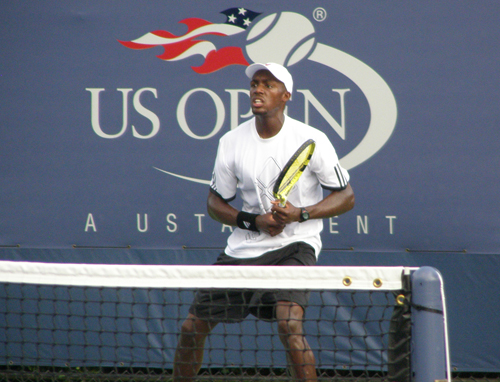By Charles Bricker
Tennis unknown Blake Strode couldn’t have been much more excited when his coach lined him up with a one-hour training session with James Blake, but Blake — that’s James Blake — seemed a bit confused for a moment when they met on court.

“Hi, I’m James,” said the veteran U.S. star who has been besieged this year by injury and a plunge in the rankings. “And I’m Blake,” Strode told him. Was James thinking, “Who is this joker?”
It was obvious that no one told him the name of the young man he would be hitting with at the Atlanta Tennis Championships, and James wouldn’t have recognized the name if anyone had. “I think it caught him off guard,” said Strode. “He had sort of a funny look.”
Eventually, James figured it out. It was no joke. As in, oh, OK, your name is Blake, too.
The name Blake Strode is almost unknown in the professional tennis community, though it’s a bit better known since he won nine matches in a 1,200-man tournament to earn a wild card into the U.S. Open qualifying later this month.
The USTA, which has a penchant for promotion, came up with the idea early this year of giving Everyman, and Everywoman, a shot at getting into the Open, and it would have been a pretty good piece of public relations had some weekend warrior from Nowhere, Nev., won the event and gotten the wild card.
Of course that wasn’t going to happen. Hundreds of players with an ongoing fantasy of playing in the U.S. Open — even the qualifying — signed up, aged 14 to nearly 70. But, not surprisingly, a number of professional players whose rankings were too low to get directly into the qualifying at a Grand Slam, also saw their chance here.
Strode, 23, currently ranked No. 594, and Alexandra Mueller, 22, at No. 445, were the winners. Not household names in tennis, but not Everyman and Everywoman, either. In fact, Strode was given an outright wild card a year ago into the U.S. Open qualifying after an All American year at the University of Arkansas.
His ranking places him 40th on the list of U.S. players while Mueller, of Abington, Pa., is 42nd among ranked U.S. women.
We’re not quite sure about Strode’s future on the ATP tour, but it’s easy to feel confident about his future in life. He has been accepted to Harvard University Law School, though that’s on hold while he explores his tennis future.
“I graduated from Arkansas in the spring of 2009 and I’ve been playing (Futures and Challengers) for a year,” he explained. “I heard about the U.S. Open qualifying playoffs in an email from the USTA and, at first, I wasn’t sure if I wanted to do it because of how it might affect my regular tournament schedule.
“But the more I looked at it, the more I knew I could fit it in. Absolutely, this was exciting. It was a chance to go back to the Open.”
He had been blown out in straight sets in his first round qualifying match in New York a year ago and felt pretty comfortable in the days leading up to the opening round. But, “Once the match started, everything hit me. I was overwhelmed by the moment. I was rushing, making a lot of mistakes. It was over pretty fast, but it was a great learning experience and it definitely made me want to go back.
“This time, I have a pretty good idea of what to expect. You know, it’s a totally different experience from the other world of playing Challengers and Futures — from the locker room to the meals to the massages. It’s all at your fingertips. I don’t want to say what they do for you at the Open is over the top, but it wasn’t what you were used to.”
Strode didn’t have a scintillating junior career, so, with his personal commitment to education, the scholarship to Arkansas was inviting. Plus, it wasn’t too far from his home in suburban St. Louis. “Four years at college. . .you learn to do things on your own and you mature as a person,” he said.
He loved the team aspect of college tennis. “Like the pressure of not letting your teammates down if the team score is tied and you’re the last match on court.” That senior year success and his year touring the ATP bush leagues got him ready for the U.S. Open qualifying playoffs.
More than a thousand players were separated into tournaments at the district level, with the survivors going to Atlanta for the final round. James Blake was there for an ATP event and Blake Strode was there attempting to win a trip back to New York.
In the final, he confronted Cecil Mamiit of South Pasadena, Calif., a 34-year-old who is retired from the ATP wars and who played a strong opening set. Strode settled down to play a little safer, won the second set and, after failing to serve out the match at 5-4 and 6-5 in the third, girded himself for the tiebreak, which he won 7-1.
He didn’t put on much of a celebration on court. “Somewhat muted,” he described it. “I’m not a real expressive guy.”
Of course, we’ll see about that if he wins his first round qualifying match at the Open.
Charles Bricker can be reached at nflwriterr@aol.com. He is an alumni of the University of California at Berkeley and has had 41 distinguished years in the news business, covering 25 NFL seasons and Super Bowls and for the last 16 years, he has covered men’s and women’s professional tennis. Listen to Charlie every Monday at 7 pm – and on podcast – on World Tennis talk at http://primesportsnetwork.com/tennis.html
